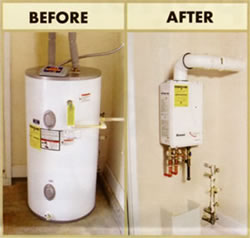Common in Europe and Japan for 75 years, tankless water heaters are still fighting for market share in Canada. The rising cost of energy may give them the boost they need to replace conventional storage tanks.

Recently my gas water heater sprung a leak. It had been working away faithfully in the basement since before we bought the house 17 years ago. Since it’s a rental from the local gas utility, I called them and they installed a new unit. It didn’t occur to me to ask about installing a tankless water heater, and they didn’t suggest one.
Many communities and utility companies are now promoting tankless water heaters as a more energy efficient option than the conventional storage units used in most North American homes. Also known as demand or instantaneous water heaters, tankless units heat water only as it is required, eliminating the need to have 200 or more litres of water sitting in a heated tank, waiting to be used.
Information from Green Venture, a non-profit environmental group, and The City of Hamilton, Ontario says that most families use hot water for a cumulative total of about one hour per day. “The other 23 hours you purchase electricity or gas to heat water is unnecessary,” says Green Venture.
Having a constantly heated tank of water is like leaving your car running all night for the morning drive to work, suggests retailer Tankless Low Energy Systems of Whitby, Ontario. On its website (www.tanklesswaterheaters.ca), the company says that “most gas tank type water heaters lose 6 F degrees per hour because they have a flue sucking the BTUs out of the stored hot water.”
Green Venture says that heating water accounts for about 20 per cent of a household’s total energy use, and that tankless water heaters can save anywhere from five per cent to 70 per cent of the energy required to heat water. That equates to annual household energy savings of about 30 per cent, says Green Venture.
Tankless water heaters have several other advantages as well. They take up much less space than conventional tanks and can be hung on a wall. Problems with mineral or scale build-up are unlikely, because there is no water storage and they can be used with water softening systems. They are a proven technology, having been in use in Europe and Asia for more than 75 years. Finally, manufacturers say they last longer than storage water heaters.
So why do most of us stick with conventional hot water heaters?
Money. Tankless water heaters can cost up to three times as much as conventional heaters.
Until recently, there was also a question of whether tankless water heaters could handle the capacity required for whole-house installations. Many of the tankless heaters currently in use are small, supplemental units installed at the point of use, such as a remote bathroom or the laundry room.
Natural Resources Canada (NRCan) says that “depending on overall water usage, they may not have the capacity to supply an entire home with hot water. For this reason, they are often used as booster heaters to supplement another water heating system.”
However, in recent years, manufacturers have been making larger tankless units for whole-house applications. “A relatively new tankless technology – the low mass water heater – is capable of supplying much more hot water to the home,” says NRCan. “These systems are typically gas-fired with electronic ignition and power exhaust, which means they are also more efficient than conventional tankless heaters. They can be connected to an external storage tank, if necessary.”
To find out what size of water heater is right for your house, you’ll need to figure out how much water flow you need to meet your home’s peak hot water demands. A report from the U.S. Department of Energy says to list the number of hot water devices you expect to have open at any one time, and add up their flow rates.
Next, select a manufacturer that makes a unit that can handle that much flow.
“Most demand water heaters are rated for a variety of inlet water temperatures,” says the Department of Energy. “Choose the model of water heater that is closest to your needs.”
A report by Platts Research & Consulting (available on the B.C. Hydro website, www.bchydro.com) says that electric heating element and gas requirements for tankless water heaters are higher than for storage water heaters. A gas tankless heater uses more BTUs per hour, so it may require larger gas lines and vents. An electric unit may require 8- or 10-AWG copper wiring, says the Platts report.
One drawback to buying a tankless water heater could be that because they are not yet common in Canada, it may not be easy to find someone to install and maintain your unit.
However, tankless water heater manufacturers are convinced that storage units are on the way out, and that before long, we’ll all be saying, “No tanks”.
Written by: Jim Adair, Homes and Cottages






0 comments on “Tankless Water Heaters…”